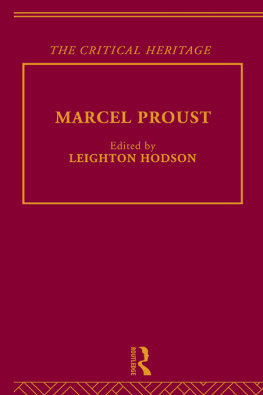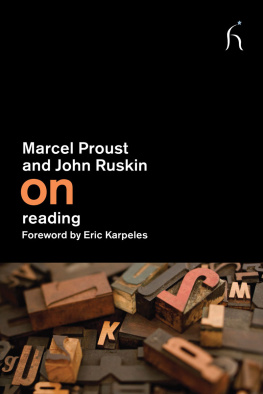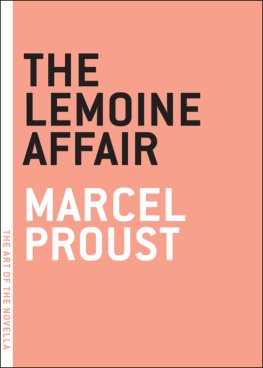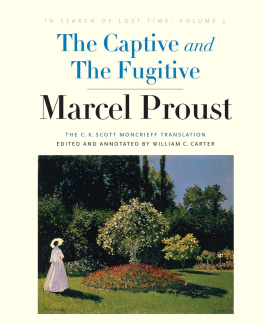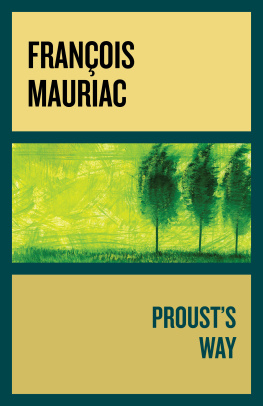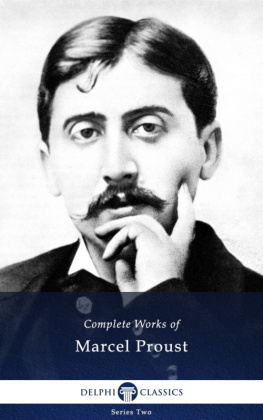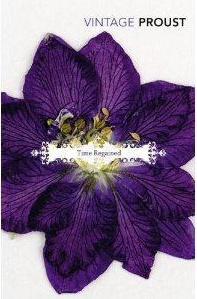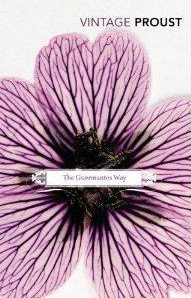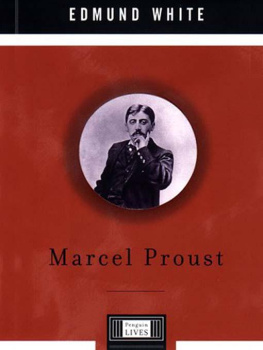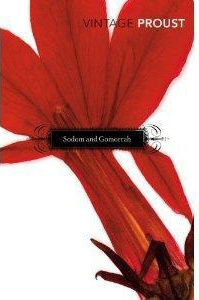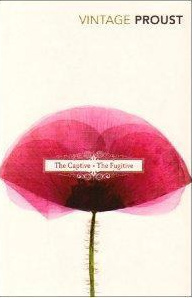Proust Marcel - Marcel Proust
Here you can read online Proust Marcel - Marcel Proust full text of the book (entire story) in english for free. Download pdf and epub, get meaning, cover and reviews about this ebook. City: London;New York, year: 1989, publisher: Routledge, genre: Detective and thriller. Description of the work, (preface) as well as reviews are available. Best literature library LitArk.com created for fans of good reading and offers a wide selection of genres:
Romance novel
Science fiction
Adventure
Detective
Science
History
Home and family
Prose
Art
Politics
Computer
Non-fiction
Religion
Business
Children
Humor
Choose a favorite category and find really read worthwhile books. Enjoy immersion in the world of imagination, feel the emotions of the characters or learn something new for yourself, make an fascinating discovery.
- Book:Marcel Proust
- Author:
- Publisher:Routledge
- Genre:
- Year:1989
- City:London;New York
- Rating:3 / 5
- Favourites:Add to favourites
- Your mark:
- 60
- 1
- 2
- 3
- 4
- 5
Marcel Proust: summary, description and annotation
We offer to read an annotation, description, summary or preface (depends on what the author of the book "Marcel Proust" wrote himself). If you haven't found the necessary information about the book — write in the comments, we will try to find it.
Marcel Proust — read online for free the complete book (whole text) full work
Below is the text of the book, divided by pages. System saving the place of the last page read, allows you to conveniently read the book "Marcel Proust" online for free, without having to search again every time where you left off. Put a bookmark, and you can go to the page where you finished reading at any time.
Font size:
Interval:
Bookmark:

MARCEL PROUST: THE CRITICAL HERITAGE
THE CRITICAL HERITAGE SERIES
General Editor: B.C.Southam
The Critical Heritage series collects together a large body of criticism on major figures in literature. Each volume presents the contemporary responses to a particular writer, enabling the student to follow the formation of critical attitudes to the writers work and its place within a literary tradition.
The carefully selected sources range from landmark essays in the history of criticism to fragments of contemporary opinion and little published documentary material, such as letters and diaries.
Significant pieces of criticism from later periods are also included in order to demonstrate fluctuations in reputation following the writers death.
MARCEL PROUST
THE CRITICAL HERITAGE
Edited by
LEIGHTON HODSON

First published in 1989
This edition published in the Taylor & Francis e-Library, 2005.
To purchase your own copy of this or any of Taylor & Francis or Routledges collection of thousands of eBooks please go to www.eBookstore.tandf.co.uk.
Compilation, introduction, notes and index 1989 Leighton Hodson
All rights reserved. No part of this book may be reprinted or reproduced or utilized in any form or by any electronic, mechanical, or other means, now known or hereafter invented, including photocopying and recording or in any information storage or retrieval system, without permission in writing from the publishers.
British Library Cataloguing in Publication Data
ISBN 0-203-19707-0 Master e-book ISBN
ISBN 0-203-19710-0 (Adobe eReader Format)
ISBN 0-415-15913-X (Print Edition)
Dedicated to
JACK BILES
192086
in remembrance of
his friendship and advice
and to
my dear wife
RUTH HODSON
193387
in deepest gratitude for
her encouragement and devotion
Je trouve trs raisonnable la croyance celtique que les mes de ceux que nous avons perdus sont captives dans quelque tre infrieur, dans une bte, un vgtal, une chose inanime, perdues en effet pour nous jusquau jour, qui pour beaucoup ne vient jamais, o nous nous trouvons passer prs de larbre, entrer en possession de lobjet qui est leur prison. Alors elles tressaillent, nous appellent, et sitt que nous les avons reconnues, lenchantement est bris. Dlivres par nous, elles ont vaincu la mort et reviennent vivre avec nous.
(Marcel Proust: Du ct de chez Swann)
General Editors Preface
The reception given to a writer by his contemporaries and near-contemporaries is evidence of considerable value to the student of literature. On one side we learn a great deal about the state of criticism at large and in particular about the development of critical attitudes towards a single writer; at the same time, through private comments in letters, journals or marginalia, we gain an insight upon the tastes and literary thought of individual readers of the period. Evidence of this kind helps us to understand the writers historical situation, the nature of his immediate reading-public, and his response to these pressures.
The separate volumes in the Critical Heritage Series present a record of this early criticism. Clearly, for many of the highly productive and lengthily reviewed nineteenth-and twentieth-century writers, there exists an enormous body of material; and in these cases the volume editors have made a selection of the most important views, significant for their intrinsic critical worth or for their representative qualityperhaps even registering incomprehension!
For earlier writers, notably pre-eighteenth century, the materials are much scarcer and the historical period has been extended, sometimes far beyond the writers lifetime, in order to show the inception and growth of critical views which were initially slow to appear.
In each volume the documents are headed by an introduction, discussing the material assembled and relating the early stages of the authors reception to what we have come to identify as the critical tradition. The volumes will make available much material which would otherwise be difficult of access and it is hoped that the modern reader will be thereby helped towards an informed understanding of the ways in which literature has been read and judged.
B.C.S.
Contents
Preface
Proust lived only for his work. The substance of his life, after important sea-changes, became the substance of his writing. It is essential to remember, however, that A la recherche du temps perdu cannot be viewed fairly as being just memoirs or confessions in some sort of disguise. Elements of these there may well be, but they are transformed by imagination.
With this in mind, I have, nevertheless, tried to provide the facts behind Prousts emergence as a writer, his preparations and ploys for getting his work published and the critical reactions to him at the time up to the point, in the early 1930s, when his world reputation was at last firmly established. I have put alongside his development as a writer and public figure only what it is necessary to say of his personal biographical circumstances to make the chronological pattern clear.
For a detailed handling of the stages in Prousts career reference should be made, in the first instance, to Philip Kolbs invaluable introductions and notes to the Correspondance, to Henri Bonnets Marcel Proust de 1907 1914, to Jean-Yves Tadis Proust and to the standard biography by George D.Painter.
Acknowledgements
I wish to express my particular thanks to the French Institute, London; Bernard Brun, Ecole Normale Suprieure, Paris, and Judith Moore, for their kind assistance.
For permission to reprint copyright material acknowledgement is due to the following: Arnold for No. 124; Henri Bergson estate for No. 9; M.Louis Billotey for No. 58; Bloud & Gay for No. 92; John Calder for No. 136; Cape for No. 121; Chatto for No. 132 and Nos 8190; Richard Cobden-Sanderson for No. 104; Collins for Nos 8190; Richard Cobden-Sanderson for No. 104; Collins for No. 16; Le Crapouillot for Nos 31 and 98; M.Francis A.Crmieux for No. 112 Dent for No. 137; Lcho de Paris for No. 27; Europe for Dominique Fernandez for Nos 119, 131; Figuire for No. 134; Flammarion for Nos 41, 57, 97, 113; Francke AG Verlag for No. 109; Gallimard for Nos 1(?), 14, 103, 119; Ghon estate for No. 22; Journal des dbats for Nos. 8, 25, 36, 40; Kra for No. 101; Librairie Arthme Fayard for No. 52; Les Marges for Nos 58, 80, 116; Le Miroir for No. 19; Mercure de France for Nos 11, 54, 117, 118, 127, 130; New Statesman for Nos 63, 64; The Nineteenth Century for No. 123; Les Nouvelles littraires for Nos 62, 111; Nouvelle Revue franaise for Nos 48, 67, 709, 96, 112, 115, 126; LOeuvre de Lon Blum, Albin Michel for No. 3; Omni for No. 65; La Petite Rpublique for No. 24; Plon-Nourrit for Nos 53, 91; Mme Rose de Pourtals for No. 106; La Revue de Paris for No. 56; La Revue hebdomadaire for No. 47; La Revue mondiale for No. 46; La Revue politique et littraire/Revue bleue for No. 21; Rieder for No. 135; Saturday Review for No. 65; Scribner, an imprint of Macmillan Publishing Company for No. 140; Slavonic Review for No. 122; Society of Authors for Nos 66 and 86; Spectator for No. 59; The Times for Nos 60, 95, 100, 108, 133; Le Temps for Nos 13, 49.
It has not been possible in some cases to locate the proprietors of copyright material. All possible care has been taken to trace the ownership of the selections included and to make full acknowledgement for their use.
Next pageFont size:
Interval:
Bookmark:
Similar books «Marcel Proust»
Look at similar books to Marcel Proust. We have selected literature similar in name and meaning in the hope of providing readers with more options to find new, interesting, not yet read works.
Discussion, reviews of the book Marcel Proust and just readers' own opinions. Leave your comments, write what you think about the work, its meaning or the main characters. Specify what exactly you liked and what you didn't like, and why you think so.

